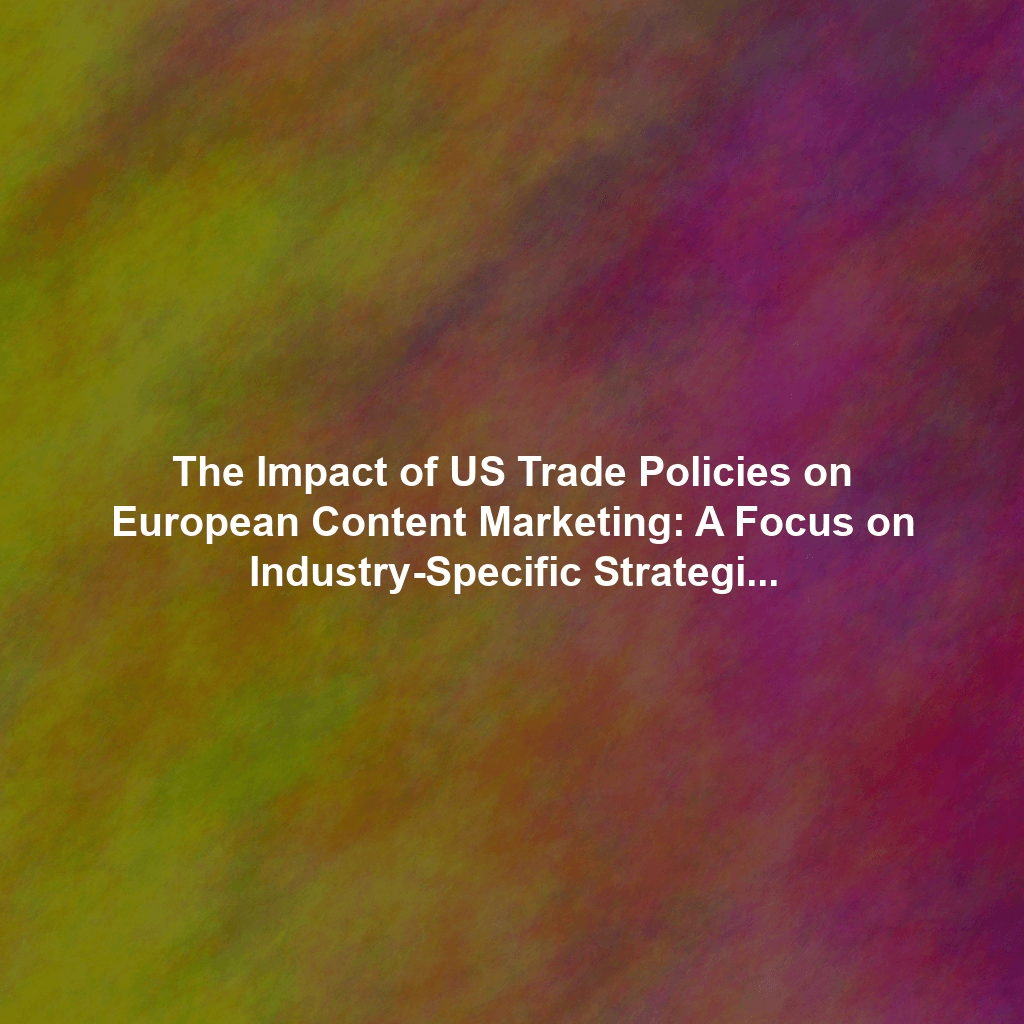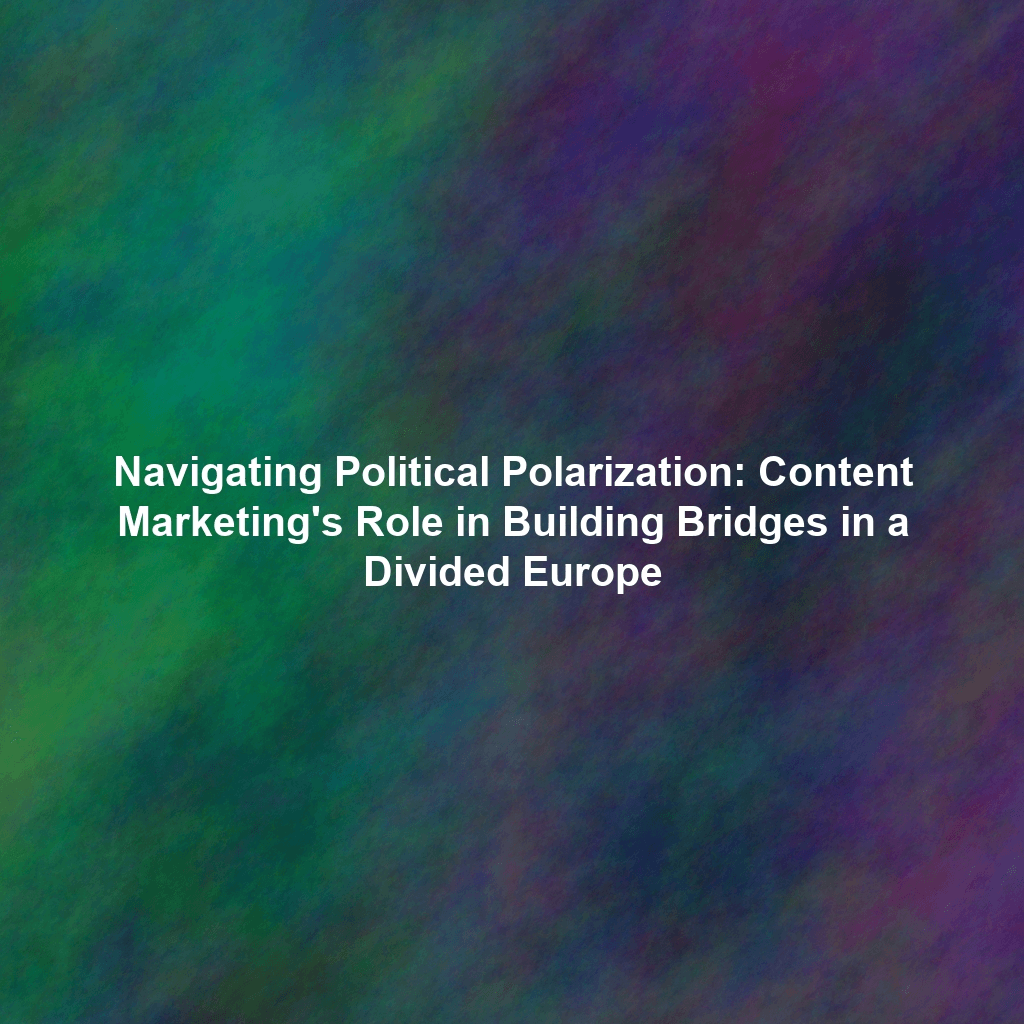Navigating the Post-Trump Trade Landscape: A New Era for European Businesses
The Trump administration’s approach to international trade was marked by protectionist measures, including tariffs on goods from key trading partners, including those in the European Union. While some of these policies have been adjusted or rolled back, the fundamental shift in global trade dynamics remains. European businesses have had to grapple with increased costs, supply chain disruptions, and altered competitive landscapes. This has necessitated a more agile and strategically focused approach to content marketing.
Understanding the Lingering Effects of Tariffs
Tariffs imposed on European goods, particularly in sectors like steel, aluminum, and agriculture, have directly impacted profitability and export competitiveness. Companies have responded by seeking alternative markets, streamlining operations, and, importantly, leveraging content marketing to highlight their unique value proposition and build stronger relationships with customers in both existing and new markets. The focus has shifted towards emphasizing quality, sustainability, and innovation to differentiate European products and services.
The Digital Trade Agenda: Opportunities and Challenges
While physical goods faced tariffs, the digital trade agenda presents a different set of challenges and opportunities. US policies around data privacy, digital services taxes, and cross-border data flows directly influence the digital landscape in Europe. Content marketers need to navigate these complex regulations, ensuring compliance while simultaneously leveraging digital channels to reach their target audiences. Transparency and ethical data handling are becoming increasingly important selling points.
Industry-Specific Content Marketing Adaptations in Europe
The impact of US trade policies varies significantly across different sectors. Here’s a look at how content marketing strategies are adapting in specific industries:
The Automotive Industry: Emphasizing Innovation and Sustainability
The European automotive industry, a significant exporter to the US, has been particularly vulnerable to trade tensions. Content marketing in this sector is now heavily focused on showcasing innovation in electric vehicles (EVs), autonomous driving technologies, and sustainable manufacturing practices. Brands are using content to highlight their commitment to reducing carbon emissions, attracting environmentally conscious consumers who are less sensitive to price fluctuations caused by tariffs. Case studies, white papers, and interactive tools are employed to demonstrate technological leadership and build trust with potential buyers.
The Agricultural Sector: Focusing on Quality and Geographical Indication
European agricultural products, renowned for their quality and geographical indication (GI), have also faced tariff-related challenges. Content marketing strategies are emphasizing the unique characteristics and heritage of these products. Storytelling plays a crucial role, highlighting the origin, production methods, and cultural significance of products like Parmigiano Reggiano cheese or Champagne. Campaigns often target niche markets willing to pay a premium for authentic European products.
The Technology Sector: Advocating for Fair Competition and Data Privacy
The technology sector faces challenges related to digital services taxes and data privacy regulations. European tech companies are using content marketing to advocate for fair competition, data sovereignty, and stricter privacy standards. They are positioning themselves as champions of consumer rights and ethical data handling, differentiating themselves from their US counterparts. Thought leadership articles, webinars, and podcasts are used to educate stakeholders and build a strong brand reputation.
Key Content Marketing Strategies for the Post-Trump Era
Regardless of the specific industry, several key content marketing strategies are proving effective in navigating the post-Trump trade landscape:
- Focus on Value-Driven Content: Create content that provides tangible value to your target audience, addressing their specific needs and pain points.
- Emphasize Authenticity and Transparency: Build trust by being transparent about your business practices, sourcing, and commitment to ethical standards.
- Leverage Storytelling: Connect with your audience on an emotional level by telling compelling stories about your brand, products, and values.
- Build Stronger Relationships with Customers: Focus on creating a loyal customer base through personalized content and exceptional customer service.
- Diversify Content Channels: Utilize a variety of content channels, including blogs, social media, video, podcasts, and email, to reach a wider audience.
- Adapt to Local Markets: Tailor your content to the specific cultural and linguistic nuances of each target market.
What is Unique About Content Marketing in Europe in the Post-Trump Era?
Content marketing in Europe in the post-Trump era is unique because it requires a much more nuanced understanding of geopolitical forces and their impact on individual industries. European marketers must also be sensitive to a higher degree of linguistic and cultural diversity than their US counterparts. Furthermore, GDPR and other privacy regulations place strict requirements on data collection and usage, forcing marketers to prioritize transparency and user consent. Finally, a greater emphasis on sustainability and ethical business practices differentiates European content marketing, as consumers increasingly demand accountability and social responsibility from brands. These factors combine to create a complex and challenging, yet also potentially more rewarding, environment for content marketers.
Conclusion
US trade policies have undoubtedly had a significant impact on European content marketing. While challenges remain, they also present opportunities for innovation and strategic adaptation. By understanding the specific implications for each industry, focusing on value-driven content, and embracing authenticity, European businesses can leverage content marketing to navigate the complexities of the global trade landscape and thrive in the post-Trump era. The key is to be agile, adaptable, and always mindful of the evolving needs and expectations of your target audience.
 Skip to content
Skip to content
